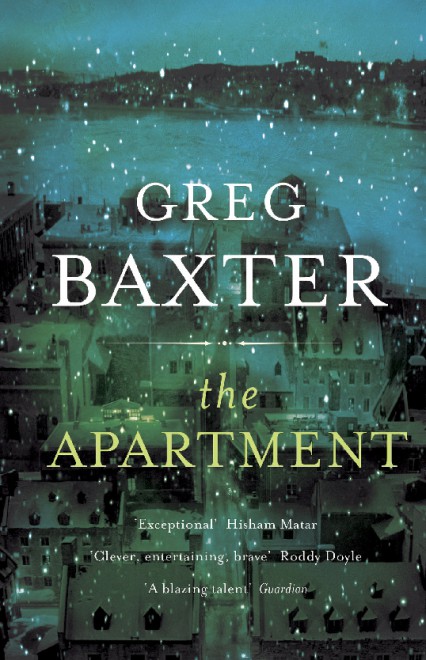Laura Wainwright delves into The Apartment, a “memorable and exciting” debut novel by Greg Baxter.
‘You know it’s quite an undertaking to start loving somebody’, Jean Paul Sartre writes in Nausea. ‘You have to have energy, generosity, blindness…. There is even a moment, right at the start, where you have to jump across an abyss: if you think about it you don’t do it’.
Greg Baxter’s enchanting first novel, The Apartment, is an exploration both of the precipitous moment that Sartre describes and, more broadly, of the conflicting feelings of progression and stasis, adventure and ordinariness, that can emerge simply with existing in the present – with being in the world. The anonymous narrator of The Apartment has been staying in a shabby hotel in an unidentified, snowbound European city for six weeks. With few connections and no discernible routine, his life has accrued a shapeless potentiality:
‘Sometimes I watch my cigarette smoke rise above me in my hotel room and disperse across the ceiling, and this is what is happening to time. I am trying to live without a preoccupation with endpoints.’

by Greg Baxter
240pp, Penguin, £12.99
The allure of irresolution and impermanence, however – an allure that is inseparable in Baxter’s novel from the experience of the unfamiliar, bustling, wintry city itself – begins to be undermined by the narrator’s newfound friendship with a local woman, Saskia, who encourages and aids him in a search for an alternative to ‘the shallow, purgatorial waters of hotel life’ – an apartment in the centre of town. In remarkably fluid and immediate prose, Baxter charts their movement towards this end, while observing with winning honesty their deepening involvement:
‘We have fallen into a swift intimacy of pure circumstance. Sitting together on the bed now as I lace up my boots it occurs to me how easily this intimacy could evaporate. Our relationship probably could not bear any conflict at all. The force that stabilises the intimacy is politeness. She is always polite, and I am always polite. Will we go now? she asks. Would you like to?’
In his first published book, a memoir entitled A Preparation for Death, Greg Baxter lays bare the root causes and consequences of his initial failings as a writer, associating his eventual success and personal acceptance with ‘the annihilation of ambition and entitlement’. ‘The future is a city’, he elaborates, ‘and I am the dream of a man who died in it. But I am also the dream that murdered that man’. In The Apartment, it transpires, Baxter’s narrator has also come to a city to dispel or exorcise an unwanted self. We learn that he is an American, from ‘the desert’, and that he has both participated in and benefited financially from the US military’s campaign in Iraq. Baxter’s interleaved account of his narrator’s vexed relationship with his past, with his native country – and with America’s and the West’s own, wider stories of ‘ambition and entitlement’ – lends his relaxed, pared down narrative an incremental weight; a weight that is similarly felt in his portrayal of day-
‘Everybody has bags in their hands. There are beggars every hundred yards. They are mostly Roma, mostly women, young, with tiny babies. [. . .] They find someone to make eye contact with and weep all over them. And then you pass and they say, please, please, please, please, please, please, please, please, please, until you are out of range.’
Baxter pledges in A Preparation for Death to, during the processes of writing and reading, ‘obliterate pretence, to give up ambition. And in this state’, he reveals, ‘my own thoughts flow toward nothing, carry nothing of significance and go where they please’. Those thoughts have truly arrived in The Apartment – at a memorable and exciting beginning.










